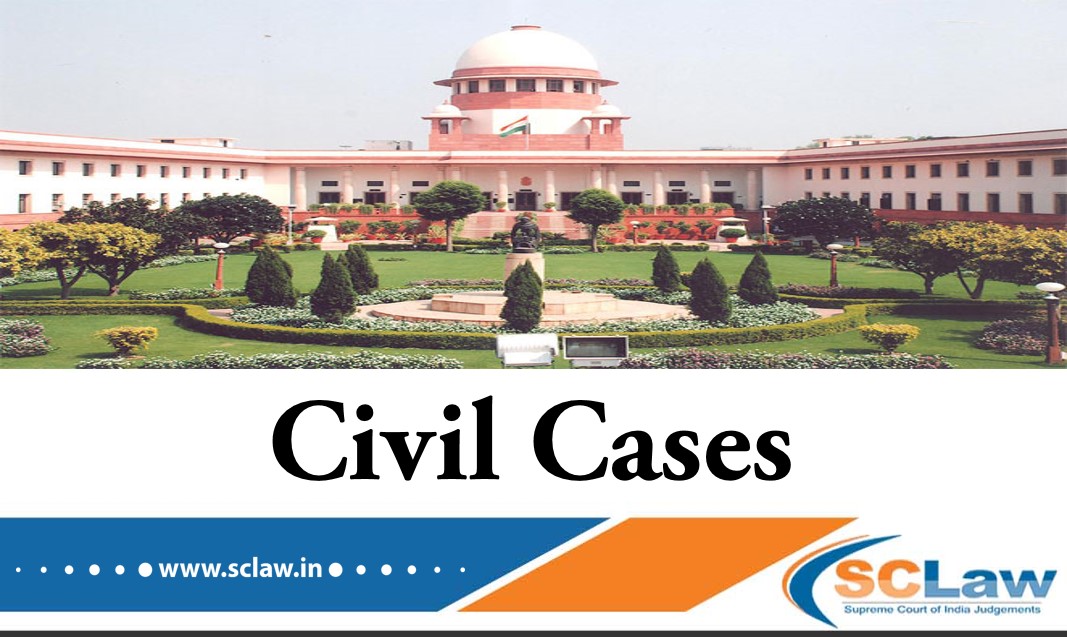Interpretation of Statutes – Fiscal statute – Liberal interpretation – Subsidies granted by Government as incentive – The amount of subsidies should not be included in actual cost which expression should liberally be construed.
AIR 1994 SC 2727 : (1994) 121 CTR 201 : (1994) 210 ITR 830 : (1994) 6 JT 330 : (1994) 4 SCALE 337 : (1994) 3 SCC 535…
Evidence Act, 1872 – Section 112 – Hindu Marriage Act, 1955 – Section 13 – DNA test – Dispute as to paternity of child – Application filed by respondent-husband for DNA test of child allowed by High Court by impugned judgment – Presumption of legitimacy is a presumption of law
(2009) 2 DMC 644 : (2009) 13 JT 395 : (2010) 157 PLR 241 : (2009) 13 SCALE 400 : (2010) 1 SCC 85 SUPREME COURT OF INDIA RAMKANYA…
Penal Code, 1860 (IPC) – Section 412 – Stolen property – Ornaments not claimed by accused except one – Offence converted from Section 412 to Section 411 IPC – Sentence reduced from 10 years to three years.
AIR 2006 SC 204 : (2005) CriLJ 123 : (2005) 9 JT 433 : (2005) 13 SCC 247 : (2005) AIRSCW 5696 : (2005) 7 Supreme 567 SUPREME COURT…
Land Acquisition Act, 1894 – Section – 4(1), 23(1) – Acquisition – Notification under Section 4(1) of the Land Acquisition Act, 1894 (1 of 1894) was published on October 24, 1961 acquiring a large extent of 1669 bighas 18 biswas of land for the planned development of Delhi – It is common knowledge that even in the same village, no two lands command same market value
(1996) 7 AD 583 : (1996) 9 JT 307 : (1996) 7 SCALE 354 : (1996) 11 SCC 542 : (1996) 6 SCR 231 Supp SUPREME COURT OF INDIA…
It is settled law that the defendant can raise mutually inconsistent pleadings in the written statement but it is for the Court to consider whether the case can be properly considered in deciding the issue.
(1996) 7 AD 587 : (1996) 8 JT 292 : (1997) 116 PLR 648 : (1996) 7 SCALE 19 : (1996) 11 SCC 690 : (1996) 5 SCR 538 Supp…
No award has been made under Section 11 of the Act – Court leave open the rights of the respondents to claim compensation for the buildings/trees in accordance with law treating the award already made as one not awarding any compensation for the buildings/trees
(1995) 7 SCALE 310 : (1996) 11 SCC 683 : (1995) 6 SCR 665 Supp SUPREME COURT OF INDIA STATE OF PUNJAB AND OTHERS — Appellant Vs. SHARAN PAL SINGH…
Penal Code, 1860 (IPC) – Sections 148 and 300 – Unlawful assembly – Murder – Eye witness not naming some of the accused persons in the evidence – In abundant caution the accused persons exonerated.
AIR 1998 SC 28 : (1998) CriLJ 62 : (1997) 6 JT 4 : (1997) 4 SCALE 398 : (1997) 11 SCC 546 SUPREME COURT OF INDIA SAUDAGAR SINGH AND…
Income Tax Act, 1963 – Section – 256(2) – Investment – Whether on the facts and in the circumstances of the case and in law the Tribunal was justified in holding that the purchase and sales by the assessee of shares in the National Rayon Corporation Ltd. and the Kohinoor Mills Ltd. should be considered as regular dealings
(1998) 9 JT 275 : (1997) 11 SCC 557 SUPREME COURT OF INDIA COMMISSIONER OF INCOME TAX (CENTRAL) BOMBAY — Appellant Vs. MAGANLAL CHHAGANLAL (P) LTD. — Respondent ( Before…
Liability to pay damages – As principle of law, the High Court was obviously incorrect in interfering with and modifying the consent decree unless parties agree for the same
(1996) 8 AD 60 : (1996) 9 JT 643 : (1996) 7 SCALE 709 : (1996) 11 SCC 678 : (1996) 6 SCR 669 Supp SUPREME COURT OF INDIA GUPTA…
Misuse of the power – Whether two persons are guilty of deliberate and/or intentional misuse/abuse of their power in the matter of the New Bank of India extending bank guarantees to and on behalf of Skipper group of companies and what loss, if any, have they caused to the bank on that account
(1997) 2 JT 426 : (1997) 2 SCALE 9 : (1997) 1 SCALE 532 : (1997) 11 SCC 430 SUPREME COURT OF INDIA DELHI DEVELOPMENT AUTHORITY — Appellant Vs. SKIPPER…












